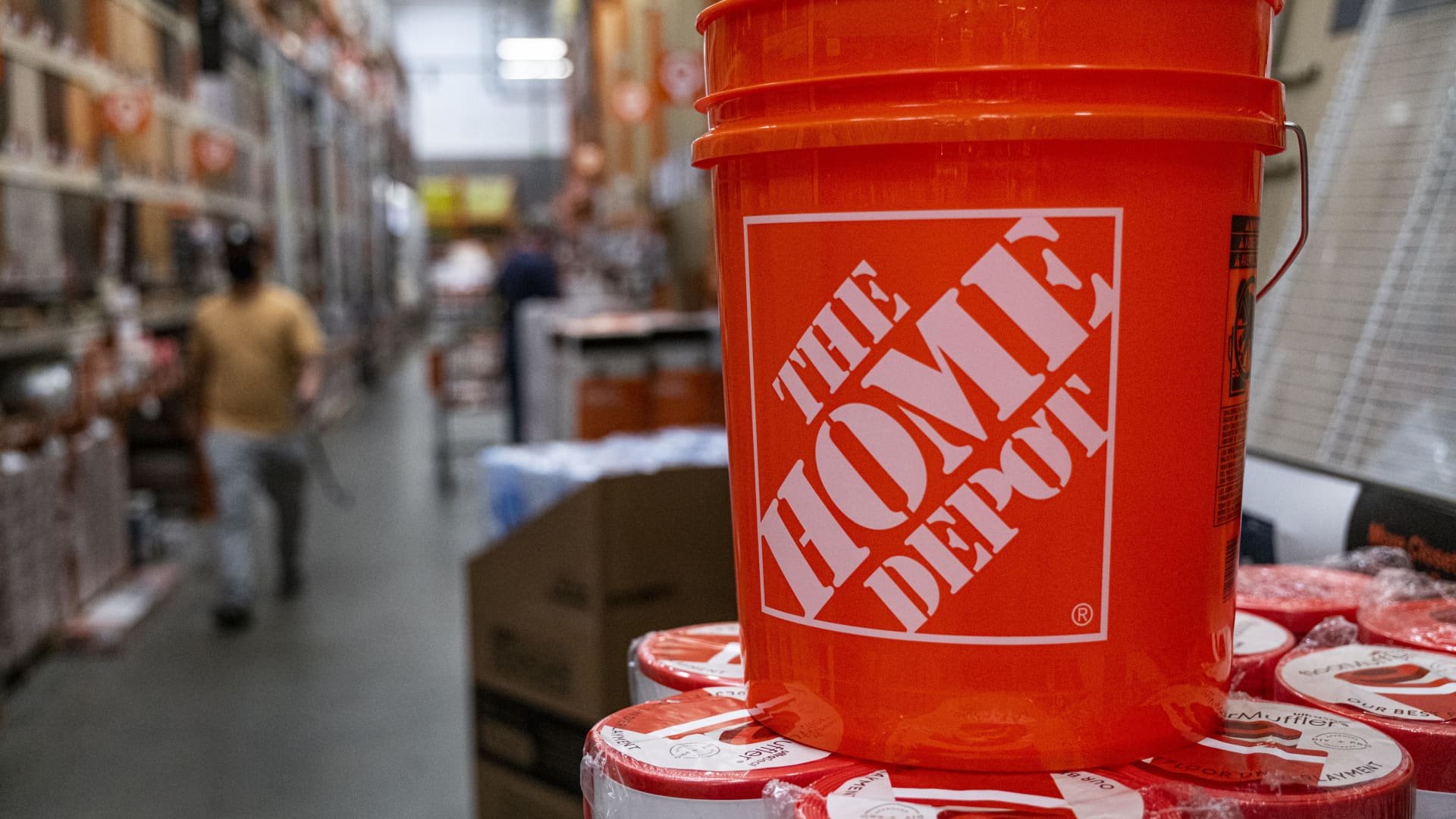A Home Depot bucket at a Home Depot store in Hercules, California, on Feb. 22, 2021.
David Paul Morris | Bloomberg | Getty Images
Home Depot on Tuesday said quarterly sales declined nearly 3% year over year, but it surpassed Wall Street’s earnings and revenue expectations despite the cooler demand.
On a call with CNBC, Chief Financial Officer Richard McPhail said demand dipped throughout the year as consumers returned to more typical spending patterns. He added that falling lumber prices and rising interest rates hurt the business.
Home Depot now sees a chance to return to growth, McPhail said.
“Our market is on its way back to normal demand conditions,” he said. “We’re not quite there yet, but the pressures we saw in 2023 are receding.”
The home improvement retailer said it expects total sales to grow about 1% in fiscal 2024, which includes an additional week. That compares with a 1.6% increase expected by Wall Street, according to StreetAccount. However, Home Depot said it expects comparable sales, which takes out the impact of store openings and closures, to decline about 1% during a period without the additional week.
Home Depot anticipates it will open about a dozen new stores over the year.Â
Here’s what the company reported for the three-month period ended Jan. 28 compared with what Wall Street expected, based on a survey of analysts by LSEG, formerly Refinitiv:
- Earnings per share: $2.82 vs. $2.77 expected
- Revenue: $34.79 billion vs. $34.64 billion expected
Net income for the fiscal fourth quarter fell to $2.80 billion, or $2.82 per share, from $3.36 billion, or $3.30 per share, a year earlier.Â
Net sales decreased from $35.83 billion in the year-ago period.
Home Depot shares fell slightly in early trading Tuesday after the company shared its quarterly results and outlook.
Slowdown from pandemic boom
Home Depot has faced a tougher sales backdrop over the past year. The home improvement retailer is following a more than two-year period when Americans had more time and money to spend on painting and fixing up their homes during the Covid-19 pandemic.Â
About half of Home Depot’s business comes from home professionals and about half comes from do-it-yourself shoppers.
Throughout the past year, McPhail and CEO Ted Decker described 2023 as “a year of moderation” after the outsized gains during the pandemic. On an earnings call Tuesday, Decker compared the pandemic to a “giant hurricane” that created an unusual period of demand.
Home Depot has also felt a pullback in consumer spending, particularly on big-ticket items, as some families postpone discretionary purchases because of inflation, put off buying a new home because of higher interest rates or choose to spend on experiences rather than goods.
On Tuesday, McPhail told CNBC that customers are still putting off bigger projects â especially the large-scale jobs that may require a loan â because of higher borrowing costs. Â
Yet, he said sales throughout the fourth quarter were pretty consistent, except for a decline in January due to colder and wetter weather. He said that temporary drop did not factor into the company’s outlook for the year ahead.Â
Decker said on the earnings call that shoppers showed they’re still willing to spend. Customers bought a lot of holiday decorations during the quarter.
The company also sold a record number of totes during a storage event, and appliances was a better performing category.
“The consumer is healthy and the consumer is engaged,” he said. “They’re just engaged at this point in smaller projects.”
Stable prices, but housing market headwinds
Average ticket and customer transactions both declined in the fourth quarter compared with the year-ago period. The average ticket dropped to $88.87 from $90.05 in the year-ago quarter, reflecting a more typical pricing environment, McPhail said.
Prices of items are lower than a year ago, a time when Home Depot and its suppliers dealt with higher costs of products and transportation rates, McPhail told CNBC. Since August, however, prices have remained steady.
“Our observation is prices will likely remain at current levels for some time,” he said.
The housing market has complicated Home Depot’s outlook, too.
Home Depot is “neutral on housing in the short term,” McPhail said on Tuesday’s earnings call.
Home values have skyrocketed by over 46% since 2019, he said, but turnover has dropped significantly. He said fewer moves have been “possibly offset by some level of improvement in place.”
As of Friday’s close, shares of Home Depot were up nearly 5% this year. That roughly matches the gains of the S&P 500 during the same period. The company’s shares closed at $362.35 on Friday, bringing Home Depot’s market value to about $360 billion.















































